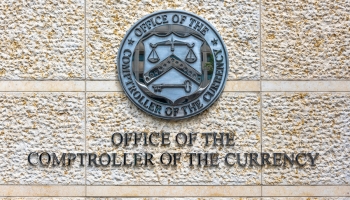OCC Publishes ‘True Lender’ Rule Change Plan
Planned new rule will address legal uncertainty regarding which entity owns a loan that it sold by a bank to a third party
- |
- Written by Banking Exchange staff

The Office for the Comptroller of the Currency (OCC) has proposed a new rule for bank loans designed to provide certainty over the identity of lenders.
The ‘true lender’ rule will help remove uncertainty created when banks package up and sell their credit and loan books to other buyers.
The planned rule will introduce a “clear test” to specify that a bank is the true lender if it is named as such in the loan agreement or funds the loan.
“Banks’ lending relationships with third parties can facilitate access to affordable credit,” the OCC said in a statement.
“However, the relationships have been subject to increasing uncertainty about the legal framework that applies to loans made as part of these relationships.
“This uncertainty may discourage banks and third parties from entering into relationships, limit competition, and chill the innovation that results from these partnerships—all of which may restrict access to affordable credit.”
Banks often sell books of credit or loans such as credit card debt through securitizations. These transactions allow banks to issue more credit and support more borrowers.
However, such deals have also created uncertainty about which party is ultimately responsible for the loan, the OCC said in its proposal.
Given the lack of specificity in the current legal framework, and the lack of previous action to address this, courts are often required to rule on whether disputed loans are made by banks or their partners.
“A growing body of case law has introduced divergent standards for resolving this issue,” the OCC said.
In some cases, it explained, the entity named in the loan agreement is sufficient for a judge to make a decision. However, many other cases have required more information to be supplied and have become far more complex.
“Even when nominally engaged in the same analysis – determining which entity has the ‘predominant economic interest’ in the transaction – courts do not necessarily consider all of the same factors or give each factor the same weight,” the OCC added.
The proposed new rule states that, “if a bank is named in the loan agreement as the lender as of the date of origination, the OCC views this imprimatur as conclusive evidence that the bank is exercising its authority to make loans”, and is subject to oversight by the OCC and other banking sector regulators.
In addition, if a bank funds a loan and so is determined by the OCC to have a “predominant economic interest” in the loan, then it will be deemed the “true lender”.
Comments on the proposal should be submitted by September 3. The OCC’s plan can be accessed via the Federal Register here.
The news comes as Connecticut-based Patriot Bank announced it had acquired pre-paid debit card deposits worth $52 million from “a prominent national provider”. Chairman Michael Carrazza said the transaction was a “pivotal move towards the bank’s longer-term deposit gathering strategy”.
Tagged under Compliance, Duties, Feature3, Feature, Fair Lending,













